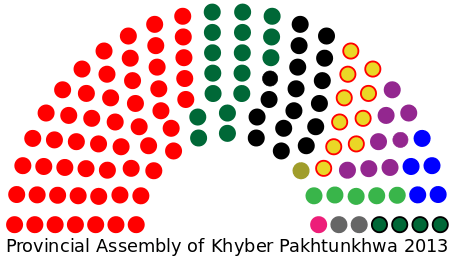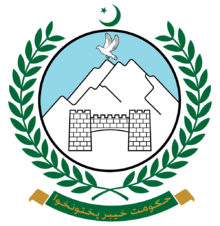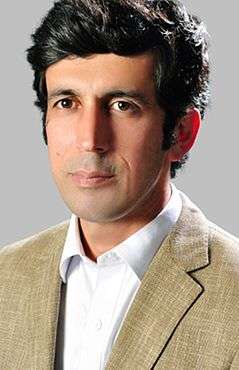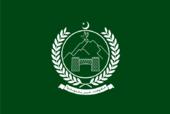Government of Khyber Pakhtunkhwa
|
Provincial Government Seal | |
|
Provincial Government Flag | |
| Seat of Government | Peshawar |
|---|---|
| Legislature | |
| Assembly | |
| Speaker | Asad Qaiser |
| Members in Assembly | 124 |
| Executive | |
| Governor | Zafar Iqbal Jhagra |
| Chief Minister | Pervaiz Khattak |
| Chief Secretary | Amjid Ali Khan |
| Judiciary | |
| High Court | Peshawar High Court |
| Chief Justice | Justice Mazhar Alam Miankhel |
The Government of Khyber Pakhtunkhwa (Pashto:دخیبر پښتونخواحکومت, Urdu: حکومتِ خیبرپختونخوا) is the provincial government of 26 Districts[1] of Khyber Pakhtunkhwa, Pakistan. The provincial government is composed of three distinct branches: legislative, executive and judicial, whose powers are vested by the Constitution of Pakistan, in the Provincial Assembly of Khyber Pakhtunkhwa, the Governor, and the provincial ourts, including the High Court, respectively. The powers and duties of these branches are further defined by acts of Assembly, including the creation of executive departments and courts inferior to the High Court.
The full name of the province is "Khyber Pakhtunkhwa". No other name appears in the Constitution, and this is the name that appears in treaties and in legal cases to which it is a party. The terms "Government of the Khyber Pakhtunkhwa" or "Khyber Pakhtunkhwa Government" are often used in official documents to represent the provincial government as distinct from other provinces of Pakistan. The seat of government is in Peshawar is commonly used as a capital for the provincial government.
Structure
The Government of Khyber Pakhtunkhwa functions under the provisions of the Constitution of Pakistan (1973). The Province has a Provincial Assembly with 124 elected members, constituent of 99 Regular seats, 22 seats reserved for women and 3 seats for non-Muslims. The Provincial Assembly elects the Chief Minister of the Province who forms a Cabinet of Ministers to look after various Departments. The Chief Minister is the Chief Executive of the Province. The Federal Government appoints a Governor as head of the Provincial Government.
The bureaucratic machinery of the province is headed by a Chief Secretary, who coordinates and supervises functions of various Departments headed by Departmental Secretaries. All the Secretaries are assisted by Additional Secretaries, Deputy Secretaries, Section Officers and other staff. The Departments may have attached Departments and autonomous or semi-autonomous bodies to look after various functions.
Since the year 2001, the system of elected District Governments has been introduced. The Province is divided into 24 districts. The Districts are headed by a Zila Nazim or district mayor assisted by a District Coordination Officer, in charge of district bureaucracy. In a District the functions are devolved further to the Tehsil, Town and Union Council Governments. Each District has an elected Zilla Council, elected Tehsil, Town and Union Councils who look after various activities at their respective levels.
At district level a District Police Officer looks after the Law and Order and he reports to the Zila Nazim. Each district has a Public Safety Commission which addresses public complaints against the Police. There is a Provincial Police Officer who is in charge of the Police system at the provincial level.
Legislative Branch

The Khyber Pakhtunkhwa Provincial Assembly is the legislative branch of the provincial government. It is unicameral legislature.
Powers of Assembly
The Constitution grants numerous powers to Assembly. Enumerated in Article 123(3), 130, 141 and 142 the Constitution of Pakistan, these include the powers to manage the purse of the province, to keep checks on the policies and practices of the government and to make laws.
Makeup of Assembly
The Assembly currently consists of 124 voting members, each of whom represents a provincial district. The number of representatives each province has in the Assembly is based on each province's population as determined in the most recent Census. All 124 representatives serve a five-year term. Each district receives a minimum of one representative in the Assembly. In order to be elected as a representative, an individual must be at least 18 years of age, and must be only a Pakistani citizen and his name appears on the electoral roll for any area in the Province. There is no limit on the number of terms a representative may serve.
Executive Branch

The executive post in the provincial government is the Governor of Khyber Pakhtunkhwa although power is delegated to the Chief Minister, Cabinet members and other officials. The governor is designated by the President on the advice of the Prime Minister and Chief Minister normally regarded a ceremonial post.
Governor
The executive branch consists of the Governor. The Governor is the head of province. The Governor, according to the Constitution, must "take care that the laws be faithfully executed", and "preserve, protect and defend the Constitution". The last Governor Methab Ahmed Khan Abbasi resigned on Feb 10,2016 because the charge of governorship was keeping him away from political activities. Fazal-ur-Rehman of JUI-F tried to grab the position for his own party but was unsuccessful and Prime Minister of Pakistan transferred the responsibility to his close associate Iqbal Zafar Jhagra on 4 March 2016.
The Governor may sign legislation passed by Provincial Assembly into law or may veto in the case of a bill other than a Money Bill preventing it from becoming law unless two-thirds of Provincial Assembly vote to override the veto.
Chief Minister
The Chief Minister is the Chief Executive of the province hence is the head of government. Under the Constitution, the Chief Minister is Leader of House. By virtue of this role, he or she is the head of the Assembly. In that capacity, the Chief Minister is allowed to vote in the Assembly. The current Chief Minister is Pervez Khattak
Cabinet and Cabinet-Level Officials
The day-to-day enforcement and administration of provincial laws is in the hands of the various provincial departments, created by Assembly to deal with specific areas of provincial and national affairs. The heads of the departments, are chosen by the Chief Minister from members of the Provincial Asse
mbly and then approved with the "advice and consent" of Governor generally known as the Chief Minister's "Cabinet".
Minister for Agriculture
| Minister of Agriculture of KP | |
|---|---|
|
Incumbent Ikramullah Khan since May 7, 2014 | |
| KP Department of Agriculture | |
| Reports to | Chief Minister |
| Seat | Peshawar |
| Appointer |
Chief Minister with Provincial Assembly advice and consent |
| Term length | No fixed term |
| Formation | August 14, 1973 |
| Website | Official Website |
The Khyber Pakhtunkhwa Minister of Agriculture is the head of the Khyber Pakhtunkhwa Department of Agriculture, concerned with Agriculture. The Minister is a member of the Chief Minister's Cabinet. Mr. Ikramullah Khan was appointed as Minister of Agriculture by Chief Minister of KP Pervez Khattak on May 7, 2014.[2][3][4][5][6]
The duties of the minister revolve around Agriculture conditions and concerns in the Khyber Pakhtunkhwa. This includes advising the Chief Minister on matters of Agriculture. It strives to administer the department of Agriculture to carry out approved programs and make the public aware of the objectives of the department.
Khyber Pakhtunkhwa Minister for Finance
| Minister of Finance of KP | |
|---|---|
|
Incumbent Muzaffar Said since October 04, 2014 |
The Khyber Pakhtunkhwa Minister of Finance is the head of the Khyber Pakhtunkhwa Department of Finance, concerned with Finance. The Minister is a member of the Chief Minister's Cabinet. Mr. Muzaffar Said was appointed as Minister of Finance by Chief Minister of KP Pervez Khattak on October 04, 2014.[7][8]
The duties of the minister revolve around Finance conditions and concerns in the Khyber Pakhtunkhwa. This includes advising the Chief Minister on matters of Finance. It strives to administer the department of Finance to carry out approved programs and make the public aware of the objectives of the department.
Minister of Health
| Minister of Health of KP | |
|---|---|
The Khyber Pakhtunkhwa Minister of Health is the head of the Khyber Pakhtunkhwa Department of Health, concerned with health matters. The Minister is a member of the Chief Minister's Cabinet. Mr. Shaukat Ali Yousafzai was appointed as Minister of Health by Chief Minister of KP Pervez Khattak on June 17, 2013.[9]
The duties of the secretary revolve around human conditions and concerns in the Khyber Pakhtunkhwa. This includes advising the Chief Minister on matters of health. It strives to administer the department of Health to carry out approved programs and make the public aware of the objectives of the department.
Minister of Local Government
| Minister of Local Government of KP | |
|---|---|
|
Incumbent Inayatullah Khan since June 17, 2013 |
The Khyber Pakhtunkhwa Minister of Local Government is the head of the Khyber Pakhtunkhwa Department of Local Government, concerned with Local Government. The Minister is a member of the Chief Minister's Cabinet. Mr. Inayatullah Khan was appointed as Minister of Local Government by Chief Minister of KP Pervez Khattak on June 17, 2013.[10]
The duties of the minister revolve around Local Government conditions and concerns in the Khyber Pakhtunkhwa. This includes advising the Chief Minister on matters of Local Government. It strives to administer the department of Local Government to carry out approved programs and make the public aware of the objectives of the department.
Minister of Minerals Development
| Minister of Minerals Development of KP | |
|---|---|
|
Incumbent Ziaullah Khan since May 7, 2014 |
The Khyber Pakhtunkhwa Minister of Minerals Development is the head of the Khyber Pakhtunkhwa Department of Minerals Development, concerned with Minerals Development. The Minister is a member of the Chief Minister's Cabinet. Mr. Ziaullah Khan was appointed as Minister of Minerals Development by Chief Minister of KP Pervez Khattak on May 7, 2014.[11][12][13][14][15]
The duties of the minister revolve around Minerals Development conditions and concerns in the Khyber Pakhtunkhwa. This includes advising the Chief Minister on matters of Minerals Development. It strives to administer the department of Minerals Development to carry out approved programs and make the public aware of the objectives of the department.
Minister of Revenue and Estate
| Minister of Revenue & Estate of KP | |
|---|---|
|
Incumbent Ali Amin Khan since June 17, 2013 |
The Khyber Pakhtunkhwa Minister of Revenue & Estate is the head of the Khyber Pakhtunkhwa Department of Revenue & Estate, concerned with Revenue & Estate matters. The Minister is a member of the Chief Minister's Cabinet. Mr. Ali Amin Khan was appointed as Minister of Revenue & Estate by Chief Minister of KP Pervez Khattak on June 17, 2013.[16]
The duties of the minister revolve around Revenue & Estate conditions and concerns in the Khyber Pakhtunkhwa. This includes advising the Chief Minister on matters of Revenue & Estate. It strives to administer the department of Revenue & Estate to carry out approved programs and make the public aware of the objectives of the department.
KPK Accountability Commission
For the first time ever in the history of any provincial government, the PTI led government of KPK presented an amendment in the parliament for the establishment of a provincial Accountability Commission. The bill was passed and KPK Ehtesab Cell was set up in 2014. KPK government as per its claim kept the Commission away from any political pressure and first time in the history of Pakistan, a serving Minister Ziaullah Afridi was arrested for corruption and misuse of Authority by any Law forcing agency. KPK Ehtesab Cell claims of recovering as much as 2 billion rupees from the corrupt bureaucrats and politicians. A controversy was created in January 2016 on amending the Accountability Law and Director General Ehtesab Commission resigned on the reservations in amendments. However, the Law was reverted through an ordinance by Chief Minister of KPK.
Cabinet
The Cabinet officers are listed below:
| Office | Incumbent | Term Began |
|---|---|---|
| Chief Minister |
|
May 31, 2013 |
| Minister of the Minister of Science & Technology |
 |
June 17, 2013 |
| Minister of Revenue and Estate |
|
June 17, 2013 |
| Minister of Elementary and Secondary Education Minister of the Minister of Energy & Power |
|
June 17, 2013 |
| Minister for Sports & Culture | Mahmood Khan |
June 17, 2013 |
| Minister of Excise & Taxation |
Mian Jamshed ud Din |
May 17, 2014 |
| Minister of Zakat & Usher | Habib Ur Rehman |
June 17, 2013 |
| Minister of Food |
Qalandar Khan Lodhi |
May 17, 2014 |
| Minister for Agriculture |
Ikram ullah khan Gandapur |
May 17, 2014 |
| Minister for Information Minister for Higher Education |
Mushtaq Ahmad Ghani |
May 17, 2014 |
| Minister of Public Health Engineering | |
May 17, 2014 |
| Minister of Local Government and Rural Development |
Inayatullah Khan |
June 17, 2013 |
| Minister for Finance |
Muzaffar Said |
June 17, 2013 |
| Minister of Law |
Imtiaz Shahid |
June 17, 2014 |
| Minister of Home & Tribal Affairs Minister of Irrigation |
Sikandar Hayat Khan |
October 20, 2015 |
| Minister of Minerals Development Minister of Labour |
Anisa Zeb Tahirkheli |
October 20, 2015 |
Judicial Branch
The Judiciary explains and applies the laws. This branch does this by hearing and eventually making decisions on various legal cases.
Provincial Departments
|
|
|
_Province_Mil_Mi-17-1_Asuspine.jpg)
See also
- Khyber Pakhtunkhwa
- Peshawar, the provincial capital of Khyber Pakhtunkhwa
- Provincial Assembly of Khyber Pakhtunkhwa
References
- ↑ Bureau Report. "KP govt creates new Kohistan district". dawn.com. Retrieved 26 July 2015.
- ↑ KP govt expands and reshuffles cabinet - thenews.com.pk
- ↑ KP government reshuffles the provincial cabinet
- ↑ Five new ministers, three advisors inducted in Khyber Pakhtunkhwa Cabinet: three special assistants to be appointed | Business Recorder
- ↑ For the promised change?: Five new ministers sworn in to provincial cabinet – The Express Tribune
- ↑ Housekeeping: K-P cabinet undergoes expansion, reshuffling – The Express Tribune
- ↑ http://www.thenews.com.pk/Todays-News-7-276661-With-new-inductions-KP-cabinet-strength-rises-to-14
- ↑ http://nation.com.pk/national/04-Oct-2014/kp-govt-inducts-more-ministers-in-cabinet
- ↑ Yousafzai visits info department
- ↑ http://tribune.com.pk/story/563100/speculation-ends-twelve-new-k-p-ministers-take-oath/
- ↑ KP govt expands and reshuffles cabinet - thenews.com.pk
- ↑ KP government reshuffles the provincial cabinet
- ↑ Five new ministers, three advisors inducted in Khyber Pakhtunkhwa Cabinet: three special assistants to be appointed | Business Recorder
- ↑ For the promised change?: Five new ministers sworn in to provincial cabinet – The Express Tribune
- ↑ Housekeeping: K-P cabinet undergoes expansion, reshuffling – The Express Tribune
- ↑ Speculation ends: Twelve new K-P ministers take oath – The Express Tribune

